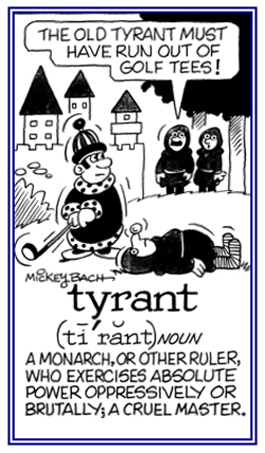You searched for:
“tyrant”
1. Someone who rules oppressively or cruelly; a despot: The tyrant, or dictator, in the country governed in an unconstrained way with great power and not by any law.
2. Anyone who exercises absolute power without a legal warrant, whether ruling well or in a bad way: In Ancient Greece, the tyrant, or swayer, had absolute authority and seized legitimate supremacy over the country, as Peisistratos, who succeeded as a tyrant in Athens in 546 B.C.
3. Etymology: from Latin tyrannus, "lord, master, tyrant"; which came from Greek tyrannos, "lord, master, sovereign, absolute ruler".

© ALL rights are reserved.
Go to this Word A Day Revisited Index
2. Anyone who exercises absolute power without a legal warrant, whether ruling well or in a bad way: In Ancient Greece, the tyrant, or swayer, had absolute authority and seized legitimate supremacy over the country, as Peisistratos, who succeeded as a tyrant in Athens in 546 B.C.
3. Etymology: from Latin tyrannus, "lord, master, tyrant"; which came from Greek tyrannos, "lord, master, sovereign, absolute ruler".

Go to this Word A Day Revisited Index
so you can see more of Mickey Bach's cartoons.
This entry is located in the following unit:
tyrann-, tyranni-, tyran-
(page 2)
Word Entries at Get Words containing the term:
“tyrant”
The sole ruler of a state, who was usually differentiated from a "king": A tyrant didn't obtain his authority or power by means of a hereditary right.
Tyrants existed throughout Greek history, but some people refer to an "age of tyranny" (mid-seventh to late sixth centuries, B.C.) when most of the Greek city states (Sparta being the special exception) were ruled by tyrants.
The tyrannies, although passed on from a father to his son, rarely lasted longer than two generations.
In Asia Minor, the Persians installed tyrants to rule their Greek subjects, but such rulers were unpopular.
This entry is located in the following unit:
Herodotus, The Fifth-Century B.C. Greek Traveler and Historian
(page 1)
